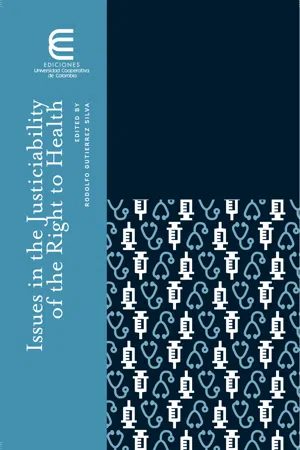
Issues in the Justiciability of the Right to Health
- 132 pages
- English
- ePUB (mobile friendly)
- Available on iOS & Android
Issues in the Justiciability of the Right to Health
About This Book
The judicialization of health care is increasing dramatically in the last decade worldwide. Although this judicial activism has undoubtedly contributed to guaranteeing the protection of this right, many challenges remain despite this progress. The objective of this book is to evaluate the different challenges and opportunities that States have in the protection of the Right to Health while maintaining a balanced level of judicial activism. More specifically, it looks to identify in what contexts judicial activism is justified in order to protect the right to health by analysing the dynamics of litigation as well as its consequences. The book starts by presenting a case in Spain. Juan Antonio Maldonado shows how conflicts between different institutions might arise as a result of disagreements about the protection of the right to health in contexts of economic crisis. As a result of that, the Court had to make difficult decisions about how to solve such conflicts. It then presents an experience in Slovakia, Central Europe. Barbara Pavlíkova examines the Health system in Slovakia describing how the health system has evolved in this country after the fall of communism and how the health system is currently being affected by many factors. In a similar vein, Cippitani and Colcelli focus on the topic of Social Rights and how they are recognized in the Italian context, and finally, Rodolfo Gutiérrez examines the case of Colombia, scrutinizing how the system, despite expanding its level of coverage, is currently generating a high level of judicialization of health. The concluding chapter carries out a comparative analysis of the cases studied in order to generate some recommendations.La judicialización de la atención médica ha aumentado dramáticamente en la última década en todo el mundo. Si bien este activismo judicial ha contribuido indudablemente a garantizar la protección de este derecho, subsisten muchos obstáculos a pesar de los avances en el tema. El objetivo de este libro es evaluar los diferentes desafíos y oportunidades que tienen los estados para proteger el derecho a la salud, al tiempo que mantiene un nivel equilibrado de activismo judicial. Más específicamente, buscadentificar en qué contextos se justifica el activismo judicial para proteger el derecho a la salud mediante el análisis de la dinámica de los litigios y sus consecuencias. El libro comienza presentando un caso en España: Juan Antonio Maldonado muestra cómo pueden surgir conflictos entre diferentes instituciones como resultado de desacuerdos sobre la protección del derecho a la salud en contextos de crisis económica. En consecuencia, la Corte tuvo que tomar decisiones difíciles sobre la manera en que se deben resolver estos conflictos. Posteriormente, se presenta una experiencia en Eslovaquia, Europa Central. Barbara Pavlíkova examina el sistema de salud eslovaco que describe su desarrollo después de la caída del comunismo y cómo muchos factores lo están afectando actualmente. En una línea similar, Cippitani y Colcelli se centran en el tema de los derechos sociales y en cómo se reconocen en el contexto italiano. Y finalmente, Rodolfo Gutiérrez examina el caso de Colombia, analizando cómo el sistema, a pesar de ampliar su nivel de cobertura, está generando actualmente un alto nivel de judicialización de la salud. El capítulo final lleva a cabo un análisis comparativo de los casos estudiados para hacer algunas recomendaciones.
Frequently asked questions
Information
| How to cite this chapter? ¿Cómo citar este capítulo? Maldonado Molina, J. A. (2019). The Exclution of Foreigners in an Irregular situation from the Right to Health Care in Spain. In R. Gutiérrez Silva (Ed.), Issues in the Justiciability of the Right to Health (pp. 28-53). Bogotá, Colombia: Ediciones UCC. doi: https://dx.doi.org/10.16925/9789587601350 |
- Foreigners under the age of 18 in Spain receive privileged treatment, as the Law recognises the right for this category of foreigner to merely stay in Spain, regardless of circumstance and without the requirement to comply with formalities such as registration. The regulation of foreign minors is not only a tributary of international provisions referring to foreigners, but also of those contemplated for Spanish minors. This can be traced back to the “Constitución Española” —hereinafter, CE— or Spanish Constitution itself where, under Article 39.4, it is indicated that “children will enjoy the same protection as that outlined under international agreements”. Article 24 of the Convention on the Rights of Children, even goes as far as to recognise the right to the enjoyment of the highest level of health and services for the treatment of diseases, as well as their rehabilitation, assuring therefore that the States Parties will deprive no child of their right to health care4.
- In the case of emergency health care, the administrative situation of the foreigner is irrelevant, and neither legal residency nor municipal census is required: Merely being in Spain is the only requirement and this also applies to foreigners in an irregular situation. This case is applicable in the case of accidents o...
Table of contents
- List of Contributors
- The Exclusion of Foreigners in an Irregular Situation from the Right to Health Care in Spain
- Justiciability of the Right to Health and the Heath System in Slovakia
- Public and Private Enforcement of Social Rights
- The Justiciability of the Right to Health in Colombia